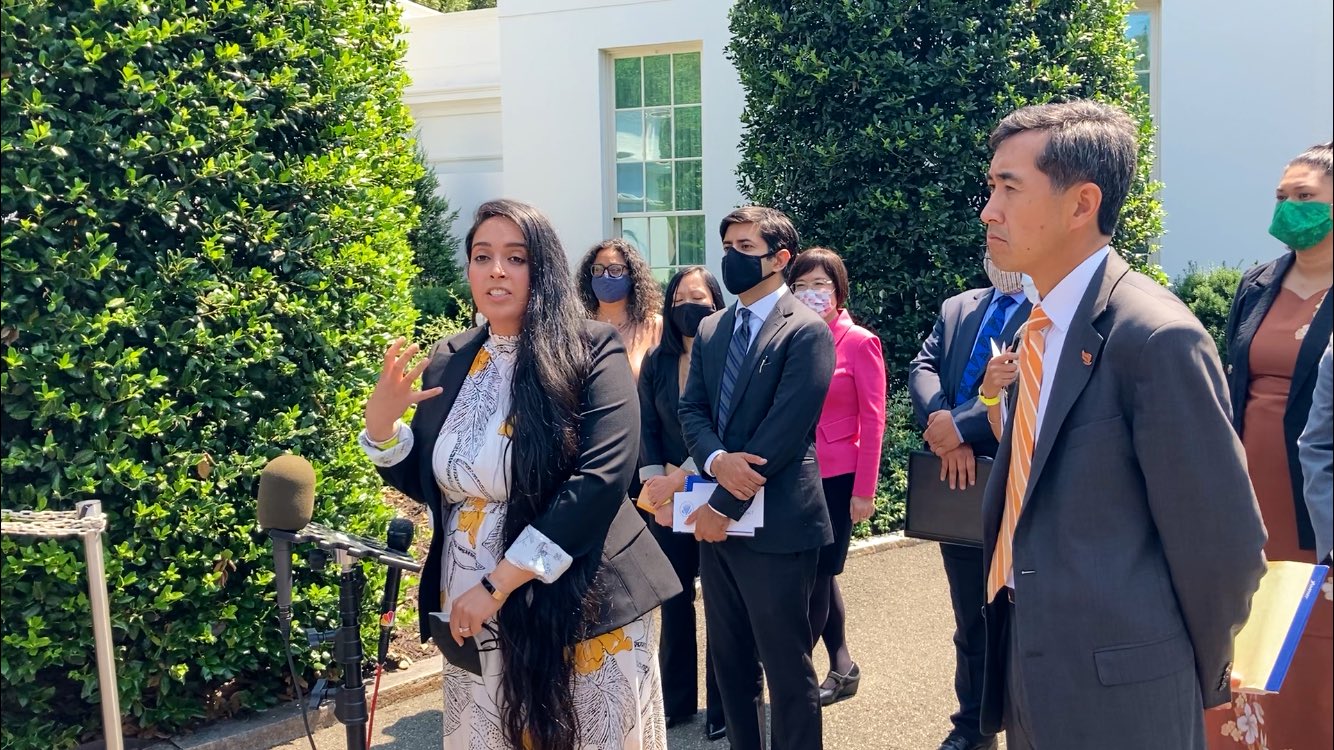
Biden and Harris meet with AAPI leaders, discuss new messaging around COVID-19, among other issues
On Thursday, Aug. 5, leaders from AAPI communities met with President Joe Biden and other White House executives to discuss immigration, anti-Asian hate, and…
On Thursday, Aug. 5, leaders from the AA (Asian-American), NH (Native Hawaiian and PI (Pacific Islander) communities met with President Joe Biden and other White House executives to discuss immigration, anti-Asian hate, and voting rights.
AAPIs in the White House pic.twitter.com/mo3E6DBbK2
— Shawna Chen (@shawnarchen) August 6, 2021
The meeting was a follow-up to the one Biden and Vice President Kamala Harris convened following the Atlanta spa shootings in March 2021. Of the eight people killed in the attack, six of them were Asian women.
Thursday’s meeting date was chosen intentionally, as it is the ninth anniversary of the 2012 Oak Creek massacre, the day a white gunman entered a Sikh gurdwara and killed six worshippers.
It was one of the deadliest days for the Sikh American community, which has faced xenophobic violence in the U.S. for over a century. On Thursday, Biden described the massacre as a “hateful act of bigotry.”
Nine years ago today, a neo-Nazi gunman with white supremacist ties murdered six Sikhs in their Oak Creek, WI, gurdwara. Another community member passed away from his injuries just last year; still others were wounded or had their lives changed forever by the loss of loved ones. pic.twitter.com/wgAj0sDc04
— Sikh Coalition (@sikh_coalition) August 5, 2021
“Today, we honor everyone impacted by this tragedy, and we think about all the pain during this pandemic with the rise of hate crimes, harassment, bullying, and other forms of bias against Asian-Americans,” he said.
Harris, White House AAPI liaison Erika Moritsugu, and Krystal Ka’ai, executive director of the White House Initiative on AANHPIs were also in attendance.
AAPI activists were eager to discuss the federal government’s response to the growing surge in anti-Asian attacks, as well as voting rights, immigration reform, coronavirus messaging, H-1B visas, and more.
Satjeet Kaur, executive director of the Sikh Coalition, immediately drew attention to the Oak Creek anniversary, noting that the meeting itself was a “real testament of building community power.”
“We are here today to talk about these issues, to build bridges and to really think about what are [the] policies that we can be putting forward to prevent and combat the violence,” Kaur said.
In addition to thanking Harris for her statement addressing the AAPI community after the Atlanta attacks, Sung Yeon Choimorrow, the head of the National Asian Pacific American Women’s Forum, brought up the importance of appropriate COVID-19 messaging.
VP Kamala Harris tells Asian American community “we stand with you,” following Atlanta area massage parlor shootings. pic.twitter.com/knl8hJ0AS8
— The Recount (@therecount) March 17, 2021
While anti-Asian racism did not originate from the pandemic, the xenophobic terms used by former President Donald Trump and other politicians served as a catalyst for hatred and blame against an entire community.
RELATED CONTENT
Choimorrow spoke about an experience she had of being harassed while walking down the street with her five-year-old child, to emphasize the need for appropriate messaging that doesn’t use racial scapegoating.
.@NAPAWF's @schoimorrow describes being harassed while walking down the street with her 5-year-old, and emphasizes the need for more careful messaging around COVID amid spikes in anti-Asian hate. pic.twitter.com/6SQK9ntyLJ
— Shawna Chen (@shawnarchen) August 5, 2021
“One of the things we asked this White House is to really consider what they are putting out about the coronavirus and the messaging around it to ensure that our community is not going to get backlash,” Choimorrow said.
Several leaders at the meeting represented organizations that focus on boosting AAPI voter turnout and family-based immigration, such as APIAVote and Indian American Impact Fund.
According to a report released by the U.S Census Bureau in April, more Asian-Americans voted in the 2020 presidential election than in any other election in history.
“The president acknowledges that our communities are essential to the fabric of America, but our current laws undermine these values,” said Neil Makhija, executive director of the Indian American Impact Fund.
Asian-American leaders are concerned that new, more restrictive laws being passed in GOP-led states could erase much of the gains the community has made.
“The most onerous restrictions being pushed and passed in Arizona, Florida, Texas, they’re geared primarily to the most active citizens, and we were some of the most newly active citizens in this latest election. We believe a lot of these restrictions are targeted toward how we as Asians voted in such large numbers,” said Varun Nikore, executive director of the AAPI Victory Alliance.
As we celebrate the 56th anniversary of the Voting Rights Act of 1965, which expanded democracy to all Americans regardless of race, we must understand the fight for voting rights still goes on today. Our democracy is under attack unlike any other time in recent history. pic.twitter.com/s4RNhShqcW
— APIAVote | #StopAsianHate (@APIAVote) August 6, 2021
Leaders from the Southeast Asia Resource Action Center, the Sikh American Legal Defense and Education Fund, the Asian Pacific American Labor Alliance, and Asian Americans Advancing Justice – AAJC were also in attendance on Thursday.
Biden says there is still much work that needs to be done to support AAPI communities, but promised that the upcoming infrastructure bill would provide funding to help American families and strengthen racial equality.











LEAVE A COMMENT:
Join the discussion! Leave a comment.